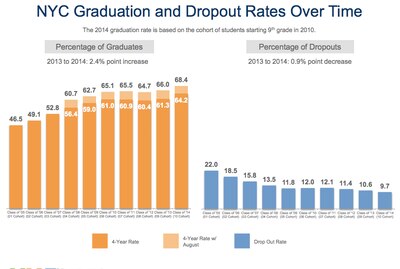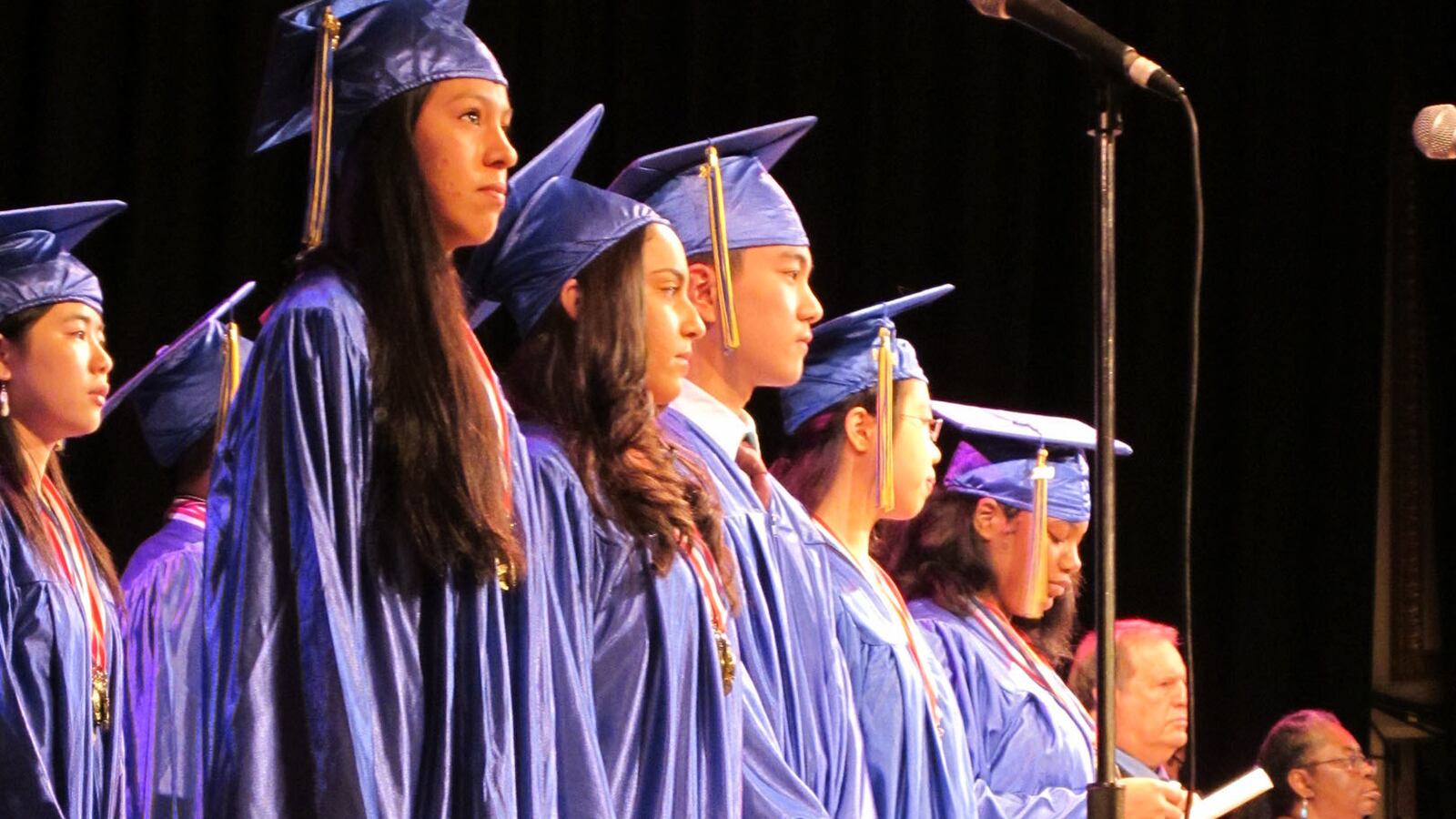Updated, 5:15 p.m. — New York City’s four-year June graduation rate jumped nearly three points to 64.2 percent this year — the largest uptick in several years — while its share of dropouts fell and the achievement gap between different student groups narrowed.
This year, 9.7 percent of students quit high school, down nearly one point from last year. At the same time, the share of black and Hispanic students who earned diplomas in 2014 grew by about 2.5 points each, shrinking the still-sizable graduation divide between them and white students. Students with disabilities made the most gains, with their graduation rate rising by 3.4 points.
The latest figures continue a decade-long upward march for the city: Since 2005, the graduation rate has increased by nearly 18 points. Despite those long-term gains, both state and city officials emphasized that more work is needed and pointed out that most high school graduates are still ill-prepared for college.
“We must make progress and increase graduation rates further, and make sure students stay in college and are equipped to have meaningful careers,” schools Chancellor Carmen Fariña said in a statement.
Only 32 percent of city graduates earned high enough test scores this year to avoid remedial math and English classes at the City University of New York, the city announced last month — a one-point improvement from the year before. Joseph Viteritti, a public policy professor at Hunter College, said officials must be cautious about touting the gains since the college-readiness rates remain so low.
“Graduation rates in this state continue to have a kind of cloud over them,” he said. “We’re really not that confident they represent a level of performance they should for students who are going to enter the job market or go onto higher education.”

While all student groups saw their graduation rates rise this year, large gaps remain.
For example, while 80.7 percent of the city’s white students earned diplomas this year, just 61.4 percent of Hispanic students and 63.8 percent of black students managed to do so. Meanwhile, the share of students still learning English who graduated by June barely budged, from 32.3 percent in 2013 to 32.5 percent this year. (The rate for students with disabilities is 36.6 percent.)
State policymakers toughened the requirements to earn a diploma two years ago. While the change did not pull down the overall graduation rate, English learners struggled to keep up, with their rate tumbling by nearly 7 points since 2011.
Recently, city and state officials have vowed to do more to help English learners. The city agreed last month to enroll more students in bilingual classes and to make sure their teachers are well trained, while the state Board of Regents proposed doubling the part of the state budget devoted to such students to $86 million next year.
The state is also considering a policy change that would let students substitute a different exam for one of the five they must currently pass to graduate, and another that would let English learners appeal low scores on their English exams. Abja Midha, a project director at Advocates for Children, said the proposals must be coupled with more classroom support.
“We definitely welcome the recent increase in attention to English-language learners,” she said. “But we definitely will be keeping an eye on what instructional supports are provided and how they play out.”
The graduation figures arrived months earlier than in past years (something the state attributed to an improved data system), and during a transitional moment for the state and city school systems.
State Education Commissioner John King announced last week that he was stepping down to join the federal education department, after guiding the state through a rocky transition to tough new learning standards. But even as the new Common Core standards caused state test scores to plunge, the statewide graduation rate has inched up during King’s tenure, with the latest figures offering King some clear progress to cite as he leaves office.
While King called the increase “encouraging” in a statement, he noted that nearly a quarter of students still fail to graduate in four years, which he argued is reason for the state to continue its support for the higher standards. A few of the Regents exams were tied to the new standards for the first time this year, but students will not need to pass a full set of Common Core tests in order to graduate until 2022.
“Students must be given every opportunity to meet those increased expectations,” King said in his statement.


